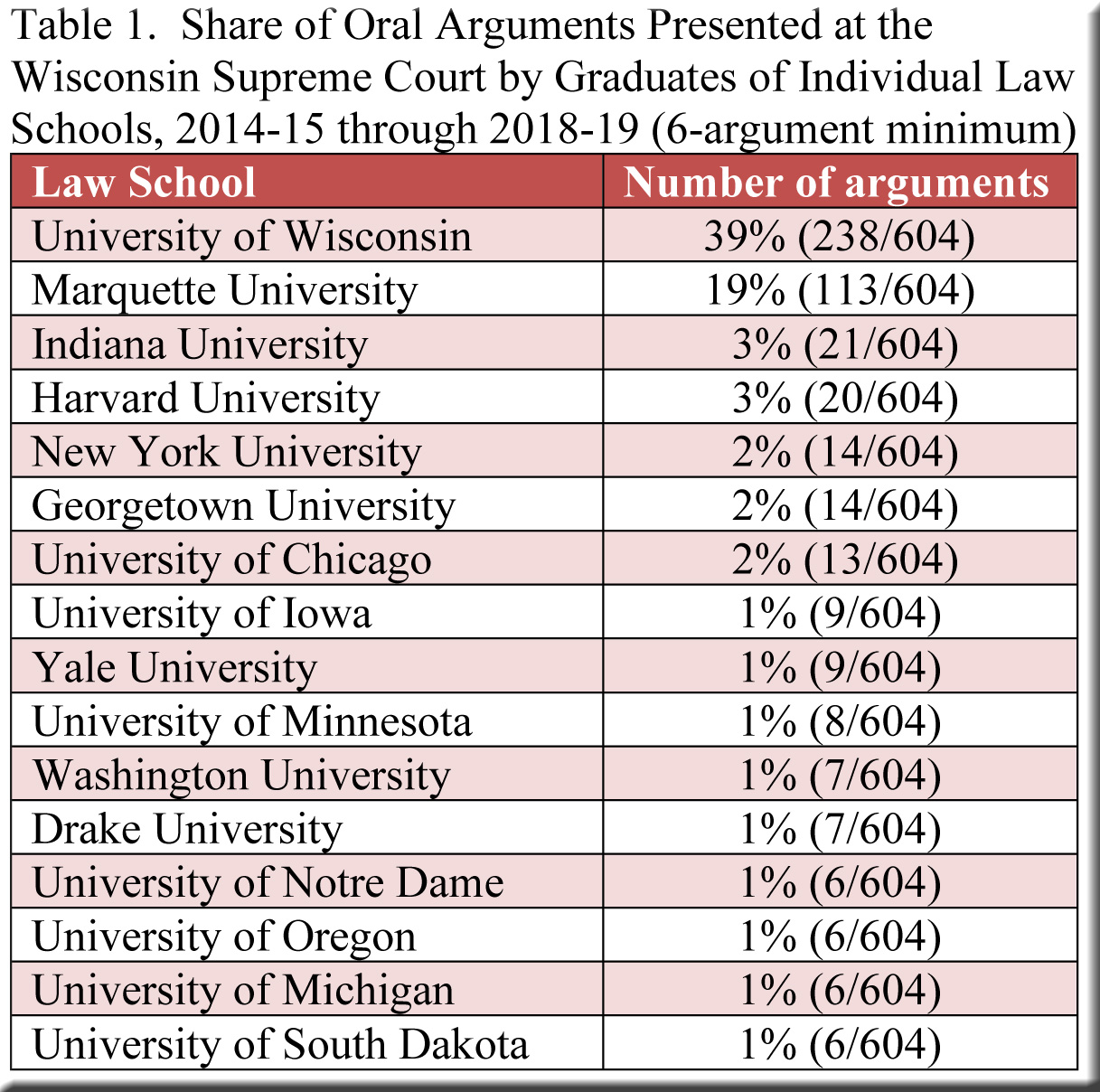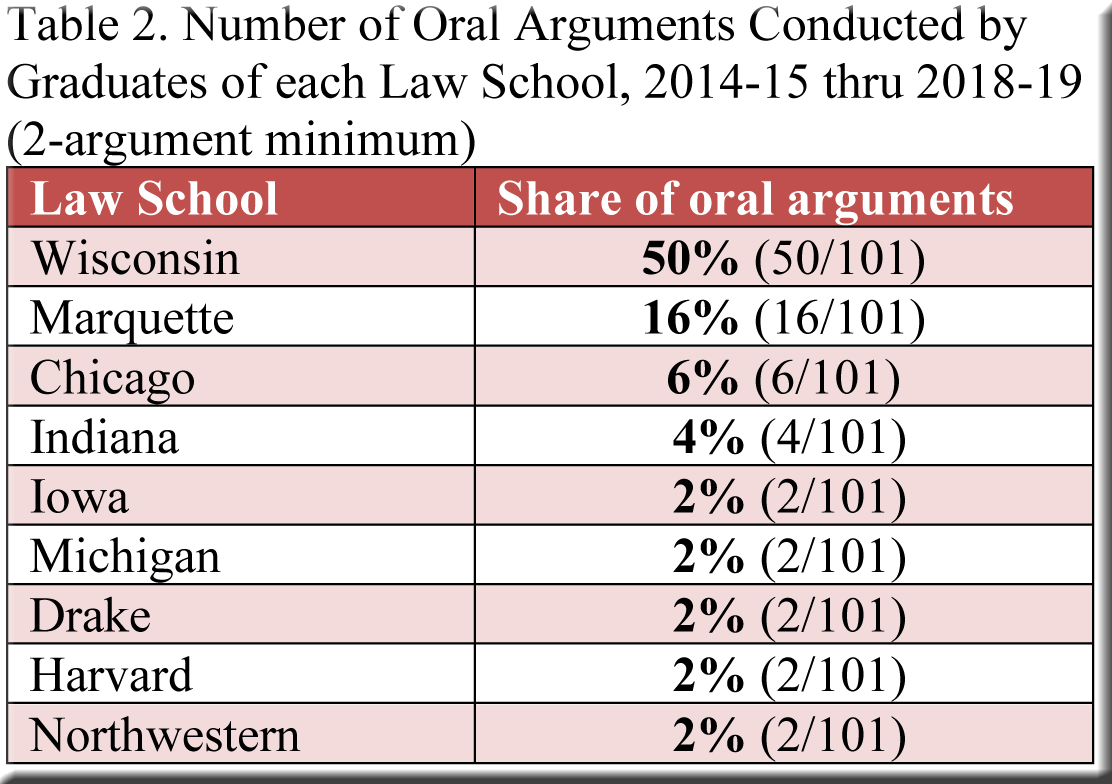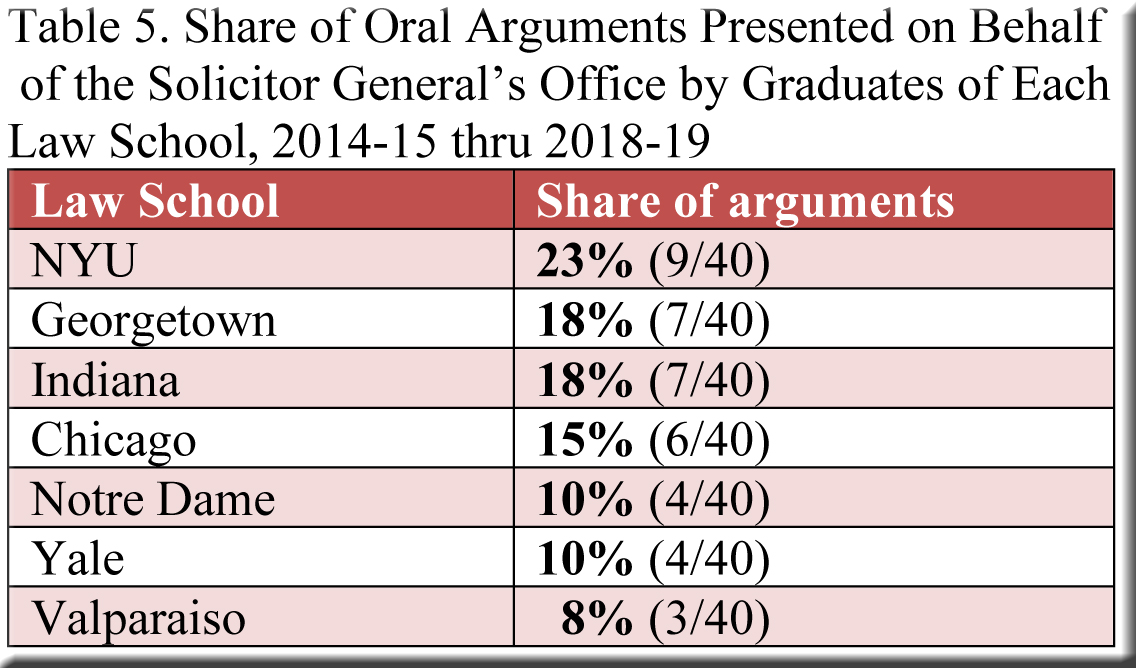In 2015, during the NCAA basketball tournament, SCOWstats conducted a university contest of another sort by comparing the number of oral arguments delivered at the Wisconsin Supreme Court by graduates of participating law schools. Although the cancellation of the basketball tournament this year has eliminated the prospect of coordination with the NCAA, we will persevere—with five more years of data—to stage the law-school portion of the event.
The big picture.
For an overview, let’s begin with all 604 oral arguments in cases decided during the past five terms (2014-15 through 2018-19).[1] Table 1 displays every law school whose graduates engaged in at least six arguments (1% of the total) over this period.
To no one’s surprise, Wisconsin’s two law schools dominated the supply of oral advocates in Madison. However, a glance at the previous post reveals that this supremacy has been eroding. During the period covered by the earlier post (2008-09 through 2013-14), graduates of the law schools at the University Wisconsin and Marquette handled fully 70% of the oral arguments heard at the supreme court. Thereafter, as shown at the top of Table 1, their combined share has sunk to 58%. Whether the decline continues—perhaps even approaching the 50% threshold—will be a question for the next post in this series.
Private firms.
Now let’s narrow our focus to private firms, excluding government agencies and non-profits. For a firm to qualify, we’ll require that its attorneys conducted at least four oral arguments out of the 604 in Table 1, which leaves us with a set of 18 firms that made the cut: Axley Brynelson ♦ Boardman & Clark ♦ Crivello Carlson ♦ Foley & Lardner ♦ Gass Weber Mullins ♦ Godfrey & Kahn ♦ Habush Habush & Rottier ♦ Husch Blackwell♦ Jeffrey Leavell, S.C. ♦ Kasdorf Lewis & Swietlik♦ Lindner & Marsack ♦ Michael Best & Friedrich ♦ Pines Bach ♦ Quarles & Brady ♦ Reinhart Boerner Van Deuren ♦ Stafford Rosenbaum ♦ Tracey Wood & Associates ♦ von Briesen & Roper ♦ Weld Riley.
Lawyers from this group presented 101 oral arguments to the supreme court during the five terms under review, and they did so with training acquired from the law schools featured in Table 2.[2]
By no means were the graduates of these schools distributed evenly among the 18 leading firms listed above. For instance, as displayed in Table 3, some firms drew more heavily on the University of Wisconsin or Marquette than did others.
Government agencies.
Although the 18 private firms were indeed active at the supreme court, the scale of their involvement could not match that of lawyers from government agencies. Of these, staff from the State Attorney General’s Office stood most often before the justices—more frequently than representatives of any other group in our array of participants.
Regarding the law schools that prepared these lawyers, Table 4 shows that the two Wisconsin universities accounted for a larger proportion than they did for attorneys in all categories of employment taken together (state, commercial, and non-profit)—but only due to an influx of attorneys from the University of Wisconsin. Graduates of Marquette University’s law school presented 19% of the grand total of oral arguments (Table 1) and exactly the same percentage of oral arguments from the Attorney General’s Office. In contrast, the University of Wisconsin’s share rose from 39% in Table 1 to 47% of the Attorney General’s arguments in Table 4.[3]
As it happened, the Attorney General’s Office was not alone in conducting oral arguments for the Department of Justice. During most of the period under our gaze, the recently formed (and even more recently abolished) Solicitor General’s Office also took cases within the DOJ. If the need for a Solicitor General’s Office was not immediately clear, observers soon concluded that it had been established as an elite unit to handle cases of the highest profile or otherwise of particular interest to the Walker administration.
Be that as it may, one difference between the offices of the Attorney General and the Solicitor General that could not be disputed was that their lawyers came almost entirely from separate sets of law schools. The only law school that appears in both Table 4 (Attorney General’s Office) and Table 5 (Solicitor General’s Office) is that of Indiana University.[4] Among other things, this meant that not a single graduate of either law school in Wisconsin gained a spot on the team of oral advocates fielded by the Solicitor General.
At the supreme court, the Department of Justice often encountered another agency’s lawyers—a large cohort from the Office of the Public Defender, the state’s other primary recruiter of litigators. And when it came to recruiting, an enormous welcome sign for the University of Wisconsin’s law school beckoned above the door of the Public Defender. Far more than at the Attorney General’s Office—to say nothing of the Solicitor General’s premises—UW-Madison’s graduates found employment at the Public Defender. As detailed in our final table, they carried out fully three-quarters of the Public Defender’s oral arguments, with graduates from no other law school—including Marquette—responsible for even ten percent.[5]
[1] The figures in this post are derived from cases decided during the five terms under consideration. That is, they do not include oral arguments delivered during this period in cases that were decided later. In an extremely small number of cases, two lawyers from the same firm split an oral argument. When this occurred, each lawyer’s law school was counted. Numerous lawyers delivered multiple oral arguments, and their law schools were credited separately for each argument.
[2] Graduates of the following law schools each presented one oral argument for the 18 private firms: Georgetown, Pennsylvania, NYU, Boston University, Ohio State, DePaul, Denver, South Dakota, Minnesota, Wyoming, Columbia, George Washington, Boston College, San Francisco, Washington University.
[3] Graduates of the following law schools each presented one oral argument for the Attorney General’s Office: Georgetown, Minnesota, Illinois, Duke, Michigan State, Northern Illinois, Harvard.
[4] Also, as indicated in the corresponding footnote, a graduate of the law school at Georgetown University delivered one oral argument for the Attorney General’s Office.
[5] Graduates of the following law schools each presented one oral argument for the Office of the Public Defender: Michigan State, Michigan, Georgetown, St. Thomas, Iowa, Virginia.






Speak Your Mind